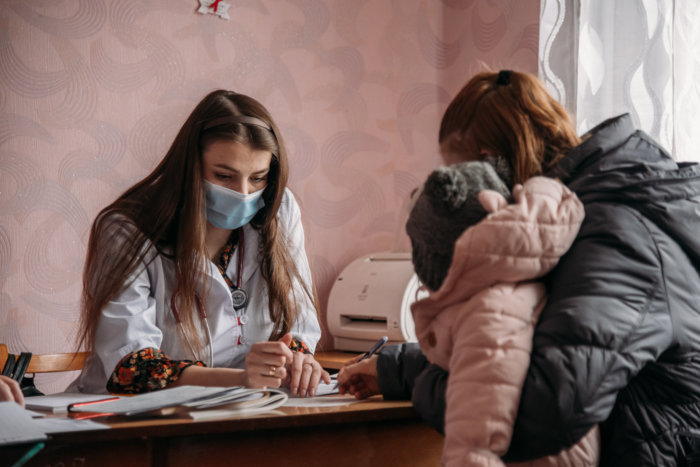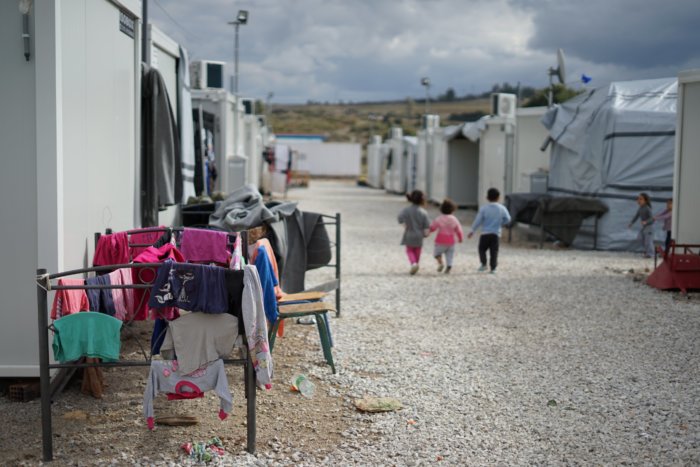How health services can welcome refugees
This World Refugee Day’s theme is about health inclusion and solutions for refugees and their host communities.
100 million people were forcibly displaced in 2022 and each facing a unique set of health challenges. Of these, more than 8 million people, primarily children, women, and older people, have fled the war in Ukraine. Many of the 3.7 million Syrian refugees living in Türkiye after escaping conflict at home, were impacted by the earthquakes in February.
Whether displaced by conflict, political danger, or natural disasters, refugees face barriers obtaining healthcare when they most need it, either on their journey or upon their arrival in host countries. This situation arises from factors such as limited entitlements to care, language barriers, and administrative and financial obstacles.
Addressing crucial health needs
WHO and its partners provide for the health of refugees in a number of ways: through mobile clinics in refugee camps, carrying out disease surveillance among people living in overcrowded conditions, mounting vaccination campaigns, and conducting research into the obstacles refugees face in getting healthcare in host countries.
Ukraine
With over 20 million people having left Ukraine since February 2022, access to healthcare remains a pressing concern. Host countries faced common challenges including a lack of preparedness due to the unanticipated nature of such a large crisis. Moreover, the lack of precise data, such as patient health data and vaccination records as well as information on access to healthcare, have proved an impediment in providing effective services and equitable access to health and social care.

© WHO Europe
How is WHO helping?
WHO was and remains one of the first emergency responders in Ukraine and led health appeals for Ukraine and refugee-receiving countries, with the crisis response appeal for 2022 fully funded by the end of the year. Now it continues expanding its presence in the countries that host displaced Ukrainians in order to help to meet growing health needs.
“We know that priorities for those within and outside Ukraine’s borders will continue to include tackling mental health needs, ensuring physical services and rehabilitation are maintained, and rebuilding the country’s health system.”
Dr. Gerald Rockenschaub, Regional Emergency Director for WHO/Europe.
Syria
Many refugees face ongoing challenges in their living situation. They grapple with the psychological and physical consequences of war and displacement, and they require primary, secondary, and tertiary healthcare. More than 6 million Syrians are estimated to be refugees in host countries, with the greatest number registered in Türkiye, followed by Lebanon and Jordan. Millions remain displaced within Syria. While national health systems in the region serve as the primary responders to their healthcare needs, access remains limited due to overwhelmed and underfunded systems, as well as financial limitations among the refugee population.

© Julie Ricard/ Unsplash
How is WHO helping?
WHO works with partners inside Syria to maintain surveillance systems, essential primary and secondary healthcare services, and address critical support functions. It also works cross-border from its field presence in Gaziantep, Türkiye to respond to urgent health needs of communities at risk including refugees. The key priorities include sexual and reproductive health, child health, immunization, care for communicable and non-communicable diseases, and mental health, with a specific emphasis on providing psychosocial support to those affected by the February earthquakes. Efforts are also being made to expand COVID-19 vaccination coverage, reinforce the response to cholera, strengthen the resilience of the health system, and tackle systemic challenges.
Horn of Africa & Sahel
In Sahel and the greater Horn of Africa, the number of refugees stands at 32.5 million. In the Sahel region alone, 6.6 million people are on the move due to persecution, conflict, and human rights violations this year. Attacks from armed groups and the constant fear of further violence account for about 75 percent of the displacement. The Sahel, already facing desertification, also deals with seasonal flooding, which resulted in 2.9 million people being displaced, 1,000 deaths, and significant damage to homes and agricultural land.
In the Horn of Africa, the devastating drought and subsequent flood crisis between 2020 and 2023 has led to the displacement of 2.7 million people and the loss of over 13 million livestock. Over 43 million people are in need of assistance across Ethiopia, Kenya and Somalia in 2023, including over 32 million people facing high levels of acute food insecurity, and more than 8 million children and pregnant and lactating women facing acute malnutrition. Additionally, the three countries are also hosting approximately 1.5 million refugees and asylum seekers.

© WHO / Ismail Taxta
How is WHO helping?
WHO is coordinating more than 350 partners in the region, delivering supplies of critical medicines including contingency stockpiles. WHO is also working towards enhancing national capacities for a swift, efficient, and resilient response from the healthcare system. The key priorities include improving the treatment of malnutrition, strengthening cholera diagnostics, providing essential services, deploying psychologists, and training outbreak response teams while re-establishing services in hospitals, and working closely with Ministries of Health.
Equitable healthcare for refugees
As refugees seek safety and a fresh start in host countries, ensuring equitable access to quality healthcare is of utmost importance. It is not only a matter of granting formal entitlements but also creating people-centered health services that are sensitive to their cultural backgrounds.
The integration of refugees into healthcare systems offers advantages for both host and refugee communities. It reduces long-term healthcare costs, drives economic growth, and promotes social cohesion, integration, and equity. Additionally, refugees benefit from improved physical and mental well-being.
Several countries have implemented innovative approaches to promote equity and inclusivity in healthcare for refugees.
- Poland established a hotline to provide comprehensive information on obtaining temporary medical licenses and navigating the national health system, ensuring equitable access for Ukrainian refugees.
- Greece developed multilingual podcasts and an online radio station in collaboration with refugees, offering health information in multiple languages, including topics such as maternal and newborn health, drug abuse, and hygiene practices.
- Furthermore, Romania and Greece employed refugees as cultural mediators, enabling arriving refugees to navigate healthcare systems with cultural sensitivity and ensuring equitable care and support.
- In Türkiye, where it was found that nearly 4 in 10 Syrian arriving refugees suffered from major depression, the Ministry of Mental Health and the WHO Refugee and Mental Health Programme initiated a joint program to help primary care providers with free, multilingual online training to diagnose and treat mental health conditions. By 2021, more than 1500 Turkish and Syrian doctors had completed the training.
WHO will continue assisting countries in integrating refugees into primary healthcare systems as part of achieving universal health coverage.
“Protecting and promoting the health of those who have been displaced from their homes and communities is not a burden, it is a responsibility for all of us.” as emphasized by Dr Santino Severoni, WHO’s Director of Health and Migration Programme.
To donate to the WHO Health Emergency Appeal for Ukraine visit: https://www.ukraine.who.foundation
To donate to the WHO Health Emergency Appeal for Türkiye-Syria earthquakes response: https://earthquakeresponse-turkiyesyria.who.foundation/
To donate to the WHO Health Emergency Appeal for the greater Horn of Africa and Sahel visit: https://hoa-sahel.who.foundation

